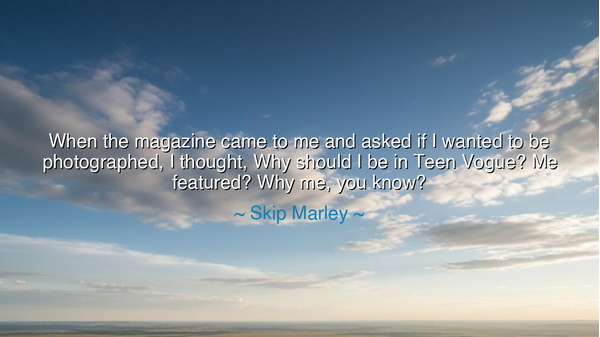
When the magazine came to me and asked if I wanted to be
When the magazine came to me and asked if I wanted to be photographed, I thought, Why should I be in Teen Vogue? Me featured? Why me, you know?






Hear the words of Skip Marley, descendant of a mighty musical lineage, who once reflected with humility: “When the magazine came to me and asked if I wanted to be photographed, I thought, Why should I be in Teen Vogue? Me featured? Why me, you know?” At first this sounds like a simple question, almost casual. But within it lies a profound teaching about humility, identity, and the weight of recognition. For it is the mark of the wise not to assume greatness, but to question it, and not to rush toward glory, but to pause and measure its meaning.
In this confession, Skip reveals the burden of the chosen. Though born into the radiant shadow of his grandfather, Bob Marley, he did not demand the spotlight, nor claim fame as his right. Instead, he asked the question of the soul: “Why me?” Such words echo the doubts of prophets and leaders through time, those who, when first called, trembled not from fear alone, but from the enormity of what was being asked of them. Thus, this moment is not about a magazine photograph but about the awakening to destiny, the realization that recognition carries both honor and responsibility.
Think upon the story of Moses, who when called to lead his people out of Egypt said, “Who am I, that I should go to Pharaoh?” He too asked, “Why me?” And yet it was precisely this humility that made him fit for the task. For those who crave the spotlight are often blinded by it, but those who hesitate, who question, who weigh the burden, are often those chosen to bear it rightly. So too with Skip Marley, whose reluctance was not weakness, but wisdom.
The words also remind us of the struggle of identity in an age of fame and media. The magazine is not just paper—it is the symbol of recognition by the world, of being seen, celebrated, judged, and remembered. To appear in such a place is not a small thing. Many chase it, longing to be known. But Skip’s question reveals the greater truth: recognition without purpose is hollow. To be seen is not enough; one must ask why, and what the seeing shall mean.
History gives us other examples. Rosa Parks, when she sat upon the bus and refused to move, did not seek fame or recognition. She was weary, and she was determined. Yet her single act was photographed, reported, and carried into the world as a spark that lit a movement. She did not ask to be in the spotlight. She might also have thought, “Why me?” Yet it was through her quiet humility that history found one of its strongest voices.
Thus, Skip’s words carry a lesson for all who are called unexpectedly into the light: do not fear the question “Why me?” For it is the question that keeps pride at bay, the question that reminds you that honor is a gift, not a guarantee. Yet also do not let this question paralyze you. Sometimes the world sees in us what we do not yet see in ourselves. Sometimes the call to be recognized is not for our sake alone, but for those whom our voice, our presence, or our example may inspire.
Therefore, my child, when the day comes that the world calls your name—whether through a magazine, a stage, a workplace, or a community—ask the question, yes: “Why me?” But do not stop there. Answer with courage: “Why not me?” Step forward not in arrogance, but in service, ready to bear the light not for yourself but for those who walk in darkness and need your flame.
So let Skip Marley’s words endure as both humility and challenge: “Why should I be featured? Why me?” Remember that the greatest leaders, artists, and heroes were those who doubted themselves first, and then rose above that doubt. The lesson is clear: recognition is not for the proud but for the willing. When called, step forward with humility, courage, and purpose, and let your light shine where it is most needed.






AAdministratorAdministrator
Welcome, honored guests. Please leave a comment, we will respond soon